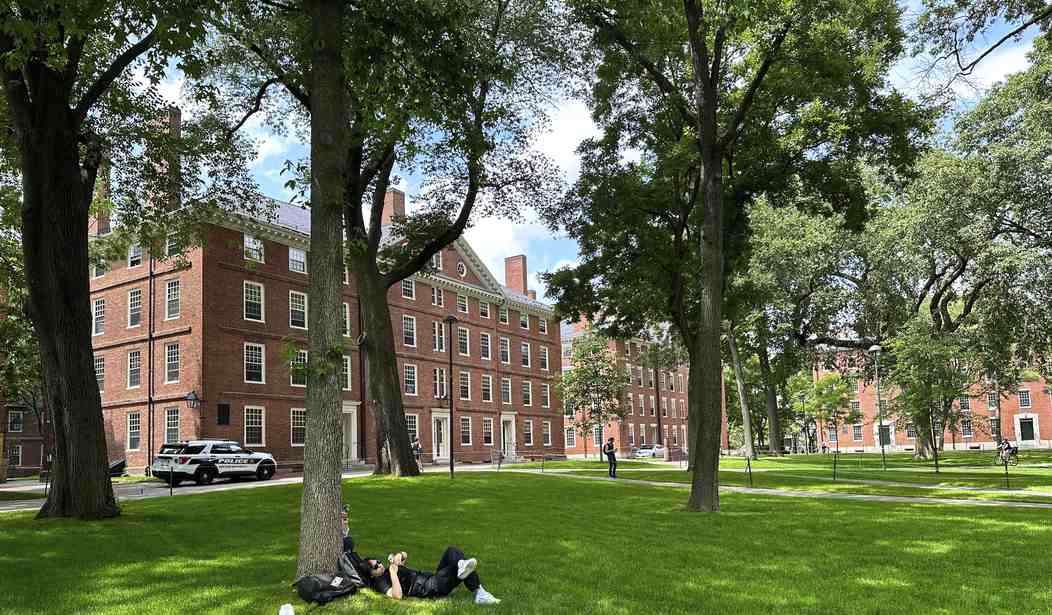As a Harvard undergraduate over three decades ago, along with dozens of my classmates, I faced discrimination when I wanted to serve my country as a Marine Corps officer.
At the time, Harvard had banned the nation’s primary scholarship program for students pursuing a military commission, the Reserve Officers Training Corps, or ROTC, from its campus twenty years earlier over faculty and student opposition to the U.S. involvement in the Vietnam War.
As a result, students like me, who — like thousands of our peers in schools across the country, including at West Point and the Naval Academy — wanted to qualify for government funding in exchange for becoming military officers were simply out of luck as a result of Harvard’s liberal agenda.
We had either to cross-register for the ROTC program through an adjacent school, MIT, and shlep early in the morning down the Charles River for required military training, or skip the scholarship program entirely, and pay Harvard’s sky-high tuition trough student loans or out of our own pocket before receiving our commissions.
Now, in the wake of Congressional testimony by the presidents of Harvard, MIT and the University of Pennsylvania exposing the hypocrisy of the Woke agenda at their schools and other elite universities in response to pro-Hamas protests – and the Harvard Board’s refusal to hold its president accountable for her central role in it – it is important to remember that this intellectual rot is nothing new, but goes back at least a half century.
Recommended
Harvard was once an unabashedly patriotic institution of higher learning. More Harvard graduates have earned our nation’s highest award for military service, the Medal of Honor, than any other school save West Point or the Naval Academy.
At the Harvard-Yale football game in my senior year of college, I had the honor of meeting one of the founders of the American Legion, World War I veteran Hamilton Fish, from Harvard’s class of 1910, just before his 102nd (and final) birthday.
Elected to Congress in 1920, Congressman Fish’s first act was introducing and passing a bill that repatriated the remains of an unknown soldier from the battlefront in Europe, leading to the establishment of the Tomb of the Unknowns at Arlington National Cemetery.
When I told Congressman Fish I was going into the Marines after graduation, he recounted meeting with Theodore Roosevelt, Harvard class of 1880, at a military training camp in Plattsburgh, New York, in 1916 – along with hundreds of Fish’s fellow recent Harvard graduates and tens of thousands more from other elite schools – after the former president bucked Democrats’ isolationism to establish the country’s Preparedness Movement before World War I.
Roosevelt himself was awarded the Medal of Honor for leading the famous “charge up San Juan Hill” in Cuba during the Spanish American War in in 1898.
Harvard’s storied, patriotic past, together with those of other great institutions of higher learning across America, is disgraced by what its current leaders have transformed the schools into today. The university presidents’ failure this week to condemn anti-Jewish genocidal rhetoric on their campuses is only the outer edge of the decline in higher education today.
Indeed, the DEI grift festers far and wide within their institutions’ ivy-colored walls – anti-free-speech codes, safe-spaces and separate graduations based on race, race-based admissions policies that persist in the wake of recent Supreme Court intervention, gender and identity majors, transgender and climate zealotry, diversity hiring – none of this would be fathomable a half-century ago, let alone a century ago in Teddy Roosevelt and Hamilton Fish’s era.
Stanford Hoover Institution fellow Victor Davis Hanson captured the price Harvard and its peers will soon pay for their atrophy: “At the present rate, a Stanford law degree, a Harvard political science major, or a Yale social science BA will soon scare off employers and the general public at large.”
As many have observed, restoring the traditions of patriotism, intellectual freedom and academic rigor – let alone greatness – to our leading universities will take more than mild donor pressure or fig-leaf ousters of their current feckless leaders. The abyss into which these schools have fallen is deep enough to require true root-and-branch reforms such as linking the availability of federal research funding and student loans to true and measurable free-speech standards at individual schools.
As Teddy Roosevelt himself observed, “It is only through labor and painful effort, by grim energy and resolute courage, that we move on to better things.” As the presidents of Harvard and other schools demonstrated this week, it’s well past time to break out the compass and chart the way back to sanity.
Mr. Ullyot is a U.S. Marine Corps veteran and a graduate of Harvard College Class of 1991. He is a former chief spokesman for the National Security Council.

























Join the conversation as a VIP Member